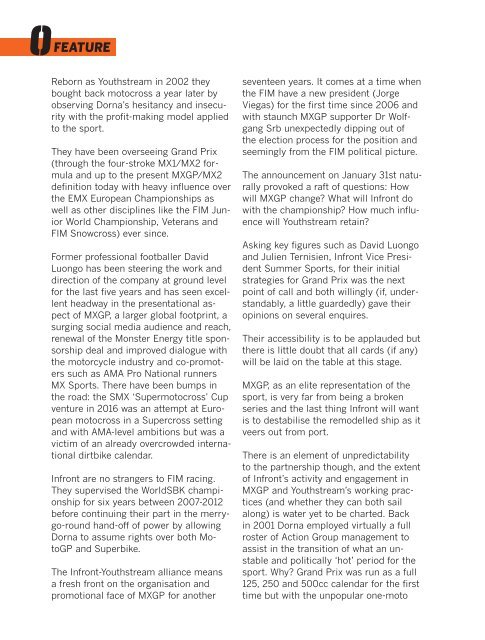Create successful ePaper yourself
Turn your PDF publications into a flip-book with our unique Google optimized e-Paper software.
FEATURE<br />
Reborn as Youthstream in 2002 they<br />
bought back motocross a year later by<br />
observing Dorna’s hesitancy and insecurity<br />
with the profit-making model applied<br />
to the sport.<br />
They have been overseeing Grand Prix<br />
(through the four-stroke MX1/MX2 formula<br />
and up to the present MXGP/MX2<br />
definition today with heavy influence over<br />
the EMX European Championships as<br />
well as other disciplines like the FIM Junior<br />
World Championship, Veterans and<br />
FIM Snowcross) ever since.<br />
Former professional footballer David<br />
Luongo has been steering the work and<br />
direction of the company at ground level<br />
for the last five years and has seen excellent<br />
headway in the presentational aspect<br />
of MXGP, a larger global footprint, a<br />
surging social media audience and reach,<br />
renewal of the Monster Energy title sponsorship<br />
deal and improved dialogue with<br />
the motorcycle industry and co-promoters<br />
such as AMA Pro National runners<br />
MX Sports. There have been bumps in<br />
the road: the SMX ‘Supermotocross’ Cup<br />
venture in 2016 was an attempt at European<br />
motocross in a Supercross setting<br />
and with AMA-level ambitions but was a<br />
victim of an already overcrowded international<br />
dirtbike calendar.<br />
Infront are no strangers to FIM racing.<br />
They supervised the WorldSBK championship<br />
for six years between 2007-2012<br />
before continuing their part in the merrygo-round<br />
hand-off of power by allowing<br />
Dorna to assume rights over both MotoGP<br />
and Superbike.<br />
The Infront-Youthstream alliance means<br />
a fresh front on the organisation and<br />
promotional face of MXGP for another<br />
seventeen years. It comes at a time when<br />
the FIM have a new president (Jorge<br />
Viegas) for the first time since 2006 and<br />
with staunch MXGP supporter Dr Wolfgang<br />
Srb unexpectedly dipping out of<br />
the election process for the position and<br />
seemingly from the FIM political picture.<br />
The announcement on January 31st naturally<br />
provoked a raft of questions: How<br />
will MXGP change? What will Infront do<br />
with the championship? How much influence<br />
will Youthstream retain?<br />
Asking key figures such as David Luongo<br />
and Julien Ternisien, Infront Vice President<br />
Summer Sports, for their initial<br />
strategies for Grand Prix was the next<br />
point of call and both willingly (if, understandably,<br />
a little guardedly) gave their<br />
opinions on several enquires.<br />
Their accessibility is to be applauded but<br />
there is little doubt that all cards (if any)<br />
will be laid on the table at this stage.<br />
MXGP, as an elite representation of the<br />
sport, is very far from being a broken<br />
series and the last thing Infront will want<br />
is to destabilise the remodelled ship as it<br />
veers out from port.<br />
There is an element of unpredictability<br />
to the partnership though, and the extent<br />
of Infront’s activity and engagement in<br />
MXGP and Youthstream’s working practices<br />
(and whether they can both sail<br />
along) is water yet to be charted. Back<br />
in 2001 Dorna employed virtually a full<br />
roster of Action Group management to<br />
assist in the transition of what an unstable<br />
and politically ‘hot’ period for the<br />
sport. Why? Grand Prix was run as a full<br />
125, 250 and 500cc calendar for the first<br />
time but with the unpopular one-moto

















